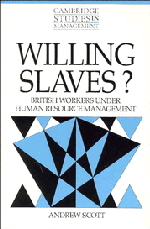1 - Co-operation at work?
Published online by Cambridge University Press: 04 April 2011
Summary
Market pressures and the growth of ‘realism’
The incompetent manager and the bloody-minded shop steward were for many years the stock-in-trade characters in ‘tales of the shop floor’. Their disappearance from stories of more recent times may reflect a transformation in industrial relations. Many people believe that British workers are now working harder and more effectively than in the past. For some, these changes are evidence of a radically altered balance of economic power. For others, they are proof that managers and workers have arrived at a new level of understanding in their relations. What is certain is that changes in workplace behaviour have caused people to think afresh about the orthodoxy which permeated labour relations since the Second World War.
Many British industrial relations experts once placed their faith in collective bargaining to build constructive and co-operative relations on the shop floor. In Britain, the Donovan Commission (1968) concluded that collective bargaining could address and reconcile the inevitable differences of interest that arose between employers and their employees. It put forward the view that encouraging comprehensive workplace agreements could not only reduce adversarial behaviour but unite workers and managers in a common purpose. During the 1960s and 1970s such ideas were put into practice, and the proportion of British workers covered by collective bargaining increased.
- Type
- Chapter
- Information
- Willing Slaves?British Workers under Human Resource Management, pp. 1 - 26Publisher: Cambridge University PressPrint publication year: 1994

